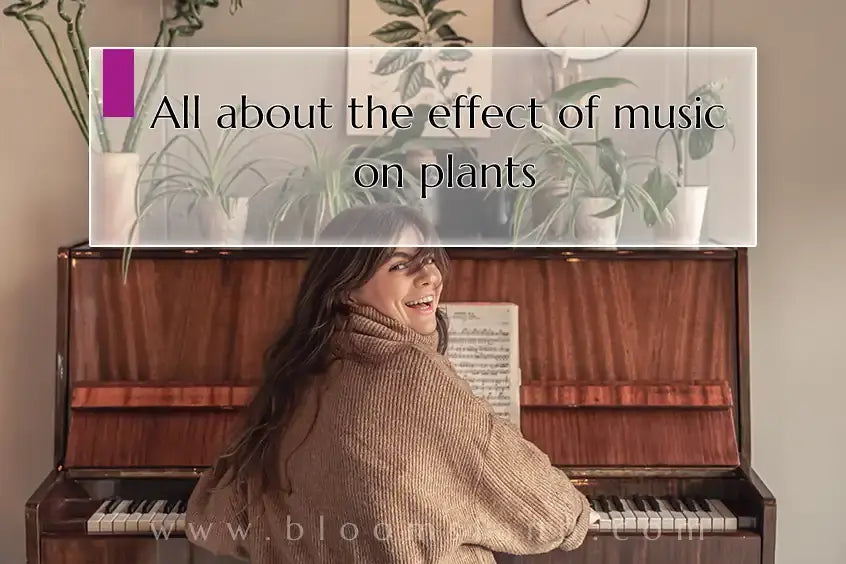
All about the Effect of Music on Plants
Flowers Melbourne have long been a popular way to add beauty and life to any home. But did you know that music can also have a positive effect on plants? Studies have shown that plants exposed to music grow faster and produce more flowers. So if you're looking for a way to boost your indoor plantscape, why not add some music to the mix? In the serene realm of nature, the dance of life extends beyond what meets the eye. Plants are often underestimated in terms of perception and have a unique connection to the auditory world. This article explores the fascinating relationship between plants and music, revealing the mystery of the effects of music on plants.
The Symphony of Growth: How Music Impacts Plants
As we dive into this harmonious exploration, let's understand the profound impact that music can have on plant growth and overall well-being.

1. Understanding the Plant Melody
Plants, it seems, have their musical preferences. Recent studies suggest that different genres of music can evoke varied responses. From the classical tunes of Mozart to the rhythmic beats of pop, each melody has a unique influence on plant behavior.
2. Rhythmic relationships
Plants respond to rhythm like dancers to music. Vibrations from sound waves can stimulate important growth hormones in plants. Perhaps this sweet connection holds the key to unlocking the full potential of our green partners.
3. Classical Elegance and Growth
Complex repertoires of classical music have been shown to have positive effects on plant growth. The soothing sound of classical music can provide the right environment for optimal development. Could this be the secret to a green garden?
The therapeutic effect of classical music
Infuse your plants with the timeless beauty of classical music and witness a harmonious transformation. The healing effect of classical music on plant growth is a revelation that harks back to the masterpieces of Mozart, Bach, and Beethoven Research suggests that the complex structure and rhythmic melodies of classical music create a suitable for optimal development. The soft play of sounds harmonizes with the very essence of plant life, creating a sense of tranquility and encouraging healthy growth Try classical music playing and let your plants drown in musical beauty in a well-designed.

Harnessing the power of Rhythm for plant success
Unlock the rhythmic secrets that can propel your plants into a realm of prosperity. Rhythm, the universal language beyond languages, greatly influences plant behavior. From pop hits to soulful jazz tunes, explore the world of music. Vibrations created by rhythmic sound waves stimulate growth hormones, triggering plants that dance in life. By harnessing the power of rhythm, you can create an environment where your plants thrive. Explore a world of musical diversity and witness the transformative impact on the well-being of your green partners.
Expression of Plant Songs: Flowers and Plants in Communication
The idea is that the flowers play a central role in the grand symphony of plant life. The appearance of new flowers not only enlivens our space but also contributes to the well-being of both humans and plants. The main focus of the bouquet is not only the beauty of the flowers but also the positive energy. As you explore the world of gardening, consider incorporating the concept of flower giving into your routine. Whether surprising a loved one with fresh flowers to enhance your atmosphere, this simple gesture can have a vibrant and lasting effect on your plants.
conclusion
In a sweet world where nature and desire intertwine, the effect of music on plants shines as a sweet phenomenon. As we play the rhythm of botany, our green companions are responding to the rhythmic dance of life. From ancient beauty to delightful floral offerings, the harmony of nature awaits our exploration. So, play the music and watch your plants bloom to the beat of the growth.
FAQ
1. How does music affect plants?
A limited amount of scientific evidence suggests that music can affect plant growth by influencing factors such as nutrient absorption and stress response. However, the full impact has not been fully established and remains a matter of debate among researchers.
2. What is the effect of sound on plants?
A few studies suggest that vibrations can affect plant growth, potentially affecting things like germination and nutrient uptake. However, the mechanisms and their overall impact are poorly understood, and more research is needed to conclude.
3. How many frequencies contribute to plant growth?
There is no clear scientific consensus on the precise universal frequency of plant growth. Some studies suggest that frequencies between 125 and 250 Hz can have positive effects, but more research is needed to establish a definitive relationship between specific frequencies and plant growth.




Leave a comment
This site is protected by hCaptcha and the hCaptcha Privacy Policy and Terms of Service apply.